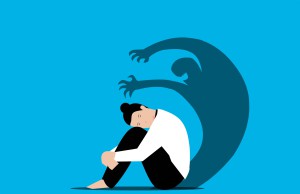OCD symptoms: the obvious (and the not so obvious)
Posted by Steven J. Seay, Ph.D. in ERP, Obsessive-compulsive disorder (OCD)
Although some OCD symptoms are more common, other symptoms can be quite idiosyncratic and often go undetected by inexperienced psychologists.
Turn on your television, and you’re likely to catch at least a fleeting glimpse of obsessive-compulsive disorder (OCD). Many popular TV shows feature characters with OCD (e.g., Emma on Glee, Monk), and it is through this lens that many members of the general population get their first exposure to OCD. Unfortunately, if your understanding of OCD is based solely on depictions in the popular media, you are likely to have a relatively limited (and perhaps, warped) sense of what OCD really is.
The truth is that OCD can manifest in many different ways. Although some symptoms are more common (e.g., a fear about about germs or getting sick), other symptoms can be quite idiosyncratic and often go undetected by inexperienced psychologists. The unfortunate consequence of this is that many people with OCD don’t know that they have OCD. Instead of recognizing their symptoms as being related to OCD, they blame themselves for their symptoms. They think that the reason they have scary or unacceptable thoughts is because they are not as “good” or as “moral” as they should be. This could not be further from the truth. In my work as a clinical psychologist, I have learned that most individuals with OCD are exactly the types of people that you would want as friends or family members. They are good, honest, hardworking people who are bombarded by near constant thoughts that are unwanted and horrifying. These thoughts often prevent them from living the lives they so desperately want for themselves and for their families. There is nothing more rewarding as a therapist than helping these individuals fight their OCD and reclaim their lives as their own.
Below, I have included some categories of symptoms associated with OCD. Some of these symptoms are common, whereas others are more unusual. If you or a loved one have any of these symptoms and they are affecting your quality of life, please consider consulting with a psychologist experienced in treating OCD. Exposure and response prevention (ERP) is a highly effective treatment for OCD, and it can help you reclaim the life you deserve.
CLEANING/WASHING COMPULSIONS
- Excessive or ritualized handwashing
- Excessive or ritualized showering, bathing, toothbrushing grooming, or toilet routine
- Involves cleaning of household items or other inanimate objects
- Other measures to prevent or remove contact with contaminants
CHECKING COMPULSIONS
- Checking locks, stove, appliances etc.
- Checking that did not/will not harm others
- Checking that did not/will not harm self
- Checking that nothing terrible did/will happen
- Checking that did not make mistake
- Checking tied to somatic obsessions
REPEATING RITUALS
- Rereading or rewriting
- Need to repeat routine activities jog, in/out door, up/down from chair)
COUNTING COMPULSIONS
ORDERING/ARRANGING COMPULSIONS
HOARDING/COLLECTING COMPULSIONS
MISCELLANEOUS COMPULSIONS
- Mental rituals (other than checking/counting)
- Excessive listmaking
- Need to tell, ask, or confess
- Need to touch, tap, or rub
- Rituals involving blinking or staring
- Measures (not checking) to prevent: harm to self, harm to others, terrible consequences
- Ritualized eating behaviors
- Superstitious behaviors
- Trichotillomania
- Other self-damaging or self-mutilating behaviors
SOMATIC OBSESSIONS
- Concern with illness or disease
- Excessive concern with body part or aspect of appearance (eg., dysmorphophobia)
AGGRESSIVE OBSESSIONS
- Fear might harm self
- Fear might harm others
- Violent or horrific images
- Fear of blurting out obscenities or insults
- Fear of doing something else embarrassing
- Fear will act on unwanted impulses (e.g., to stab friend)
- Fear will steal things
- Fear will harm others because not careful enough (e.g. hit/run motor vehicle accident)
- Fear will be responsible for something else terrible happening (e.g., fire, burglary)
SEXUAL OBSESSIONS
- Forbidden or perverse sexual thoughts, images, or impulses
- Content involves children or incest
- Content involves homosexuality
- Sexual behavior towards others (Aggressive)
HOARDING/SAVING OBSESSIONS
RELIGIOUS OBSESSIONS (Scrupulosity)
- Concerned with sacrilege and blasphemy
- Excess concern with right/wrong, morality
OBSESSION WITH NEED FOR SYMMETRY OR EXACTNESS
- Accompanied by magical thinking (e.g., concerned that another will have accident unless things are in the right place)
- Not accompanied by magical thinking
MISCELLANEOUS OBSESSIONS
- Need to know or remember
- Fear of saying certain things
- Fear of not saying just the right thing
- Fear of losing things
- Intrusive (nonviolent) images
- Intrusive nonsense sounds, words, or music
- Bothered by certain sounds/noises
- Lucky/unlucky numbers
- Colors with special significance
- Superstitious fears
CONTAMINATION OBSESSIONS
- Concerns or disgust with with bodily waste or secretions (e.g., urine, feces, saliva)
- Concern with dirt or germs
- Excessive concern with environmental contaminants (e.g. asbestos, radiation toxic waste)
- Excessive concern with household items (e.g., cleansers solvents)
- Excessive concern with animals (e.g., insects)
- Bothered by sticky substances or residues
- Concerned will get ill because of contaminant
- Concerned will get others ill by spreading contaminant
- No concern with consequences of contamination other than how it might feel
Symptoms adapted from the Y-BOCS developed by Goodman, W.K., Price, L.H., Rasmussen, S.A. et al.: “The Yale-Brown Obsessive Compulsive Scale.” Arch Gen Psychiatry 46:1006-1011,1989.
Questions? Comments? Sound off below. …or continue the discussion on Facebook, Twitter, or Google+.




